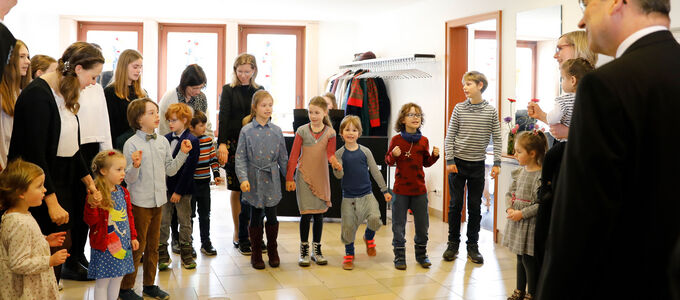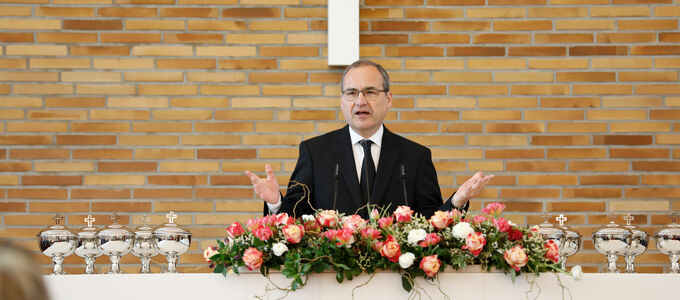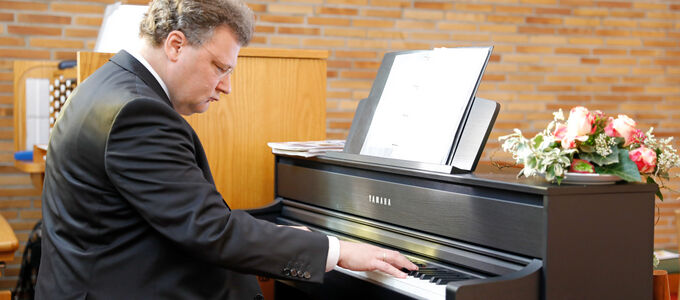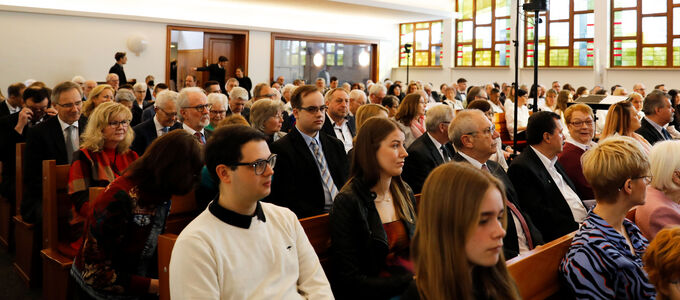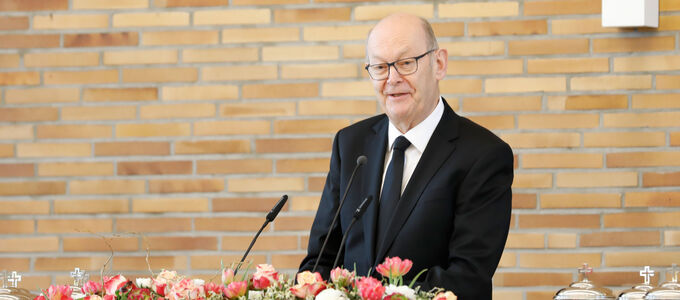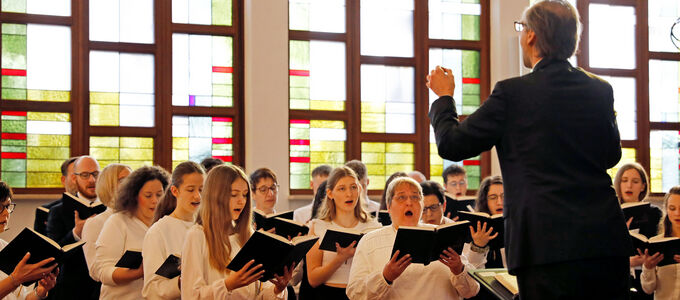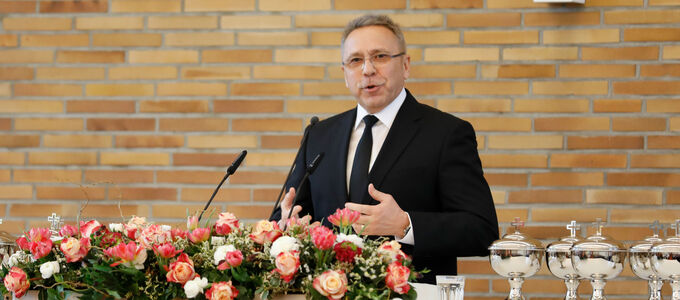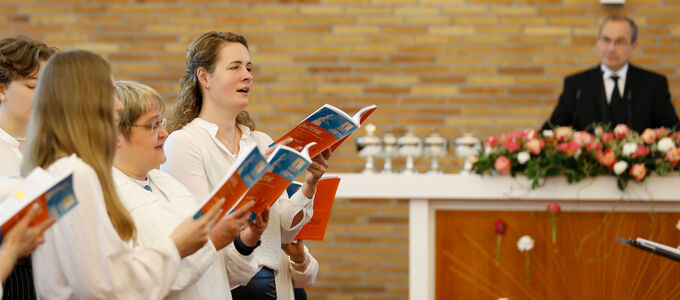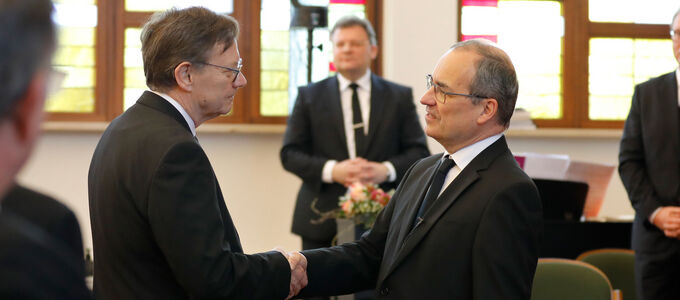“This shall not happen to You!”
Jesus prepared His disciples for a situation that would unsettle them completely and leave them helpless: His suffering and death, and His resurrection. Chief Apostle Schneider addressed the different reactions of the disciples in a divine service in the congregation of Lüneburg in Germany.
This divine service on 19 March was based on Jesus’ second prediction of His death and resurrection: “For He taught His disciples and said to them, ‘The Son of Man is being betrayed into the hands of men, and they will kill Him. And after He is killed, He will rise the third day.’ But they did not understand this saying, and were afraid to ask Him” (Mark 9: 31–32).
In his sermon, Chief Apostle Jean-Luc Schneider addressed the different reactions of the disciples.
The disciples miss the point and are afraid to ask
At first, the disciples missed the point and were afraid to ask Jesus what He meant. “They did not really want to hear it and chose to ignore it,” Chief Apostle Schneider said and went on to explain the reason. The disciples had been together with Jesus and enjoyed all the positive aspects associated with this fellowship: “We can come to Him when we need help. He has great power. He teaches us, and if we follow Him, we will be blessed. It is beautiful to have fellowship with Him, which is why we serve and help Him.” When Jesus then spoke about the things that were about to take place, the disciples did not want to hear of it: “The situation suits us perfectly. Why should anything need to change?” Jesus made it clear to them: “Careful! Things won’t continue like this. There will be a turning point. You must prepare yourselves for that.”
According to the Chief Apostle, many believers today enjoy the fellowship in the church and participate in it, and yet they are in danger of no longer perceiving the message of Christ’s return. “God wants to tell us: be careful, things are not going to continue like this, there will be a profound change. Jesus Christ will return. God will intervene in human history. And then everything will be different. We must prepare ourselves for this,” the Chief Apostle explained the concrete implications. He went on to say: “We hear the message, which is part of it, but we are content because what we experience is just fine, and we think that things are just going to continue like this.” Chief Apostle Schneider urged the brothers and sisters to ask themselves, What does this message mean for me personally?
Peter disagrees
Peter took Jesus aside after His announcement and began to rebuke Him: “This shall never happen to You!” He could not understand how it could be possible that Jesus would suffer and die, that He would be killed. What Peter had not understood was that Jesus had to fulfil the will of His Father in order to overcome evil.
Similar thoughts could also arise in us when we see our brother and sister suffering: “Dear God, you can’t possibly allow this!” Often we hope that if we all pray and believe enough together that the circumstances will change. The Chief Apostle made it clear that no matter how fervent our prayers may be, it is not possible to impose our own will on God. “His help consists of our being able to overcome trials, that we can remain faithful, and be a true witness of Jesus Christ.” This should also take priority in our prayers.
The disciples are filled with grief
When the disciples realised that the course of events was now inevitable, they were filled with sadness. “They had forgotten something very important. They had only heard the first part of the announcement: ‘I will suffer and die.’ What they had not heard was: ‘I will rise the third day.’”
As was the case then, there is a danger of our being incapable of taking action because of sadness caused by misconceptions. In the time before Christ’s return, the Chief Apostle said that believers will go through a period of affliction and trials. But the Chief Apostle pointed out that this is different from what we might suppose: “Our notion is that the work of God is developing, the Apostles are carrying out their mission, and when the last soul has been sealed the Lord will return.” In the past, we often spoke of a time of affliction and trials, of evil days, and often reckoned with a period of persecution.
However, the greatest challenge facing the church today is not persecution, but disinterest in God. “No one actually expected this lack of interest on the part of Christianity. This makes one very sad and this sadness takes over.” However, Jesus predicted it and the Holy Spirit always warned us that there will come a difficult time and not to be surprised. The Chief Apostle encouraged the congregation: “Please don’t forget the second half of the promise: the resurrection, the return of the Lord.”
James and John wanted more
James and John, on the other hand, understood the announcement of Christ’s suffering, death, and resurrection. They realised that things were coming to an end, that Jesus Christ wanted to establish His kingdom. They wanted to secure their position: “Grant us that we may sit, one on Your right hand and the other on Your left, in Your glory.” However, the conclusion they drew from Jesus’ announcement was wrong. They had wanted to secure their own position and future. But Jesus wanted the disciples of that time and the Christians of today to understand this: “If the love of Christ dwells in us, we do not seek to obtain more than others. It is our task to contribute our share and make sure that our neighbour, whoever he or she may be, can receive the same salvation as we do.”
The disciples did not take Jesus’ warning seriously
Shortly before He was arrested in Gethsemane, Jesus warned them: “You will all betray Me.” And the Bible tells us that all those who were present said: “No, this will not happen! We will never betray you!” Jesus knew that they would betray Him anyway, nevertheless He promised them: “I will take you to Myself, I will give you grace.”
Everyone’s salvation is dependent on the grace of Jesus: “We cannot do it alone. We need the Lord’s help. Without Him we can do nothing.”


